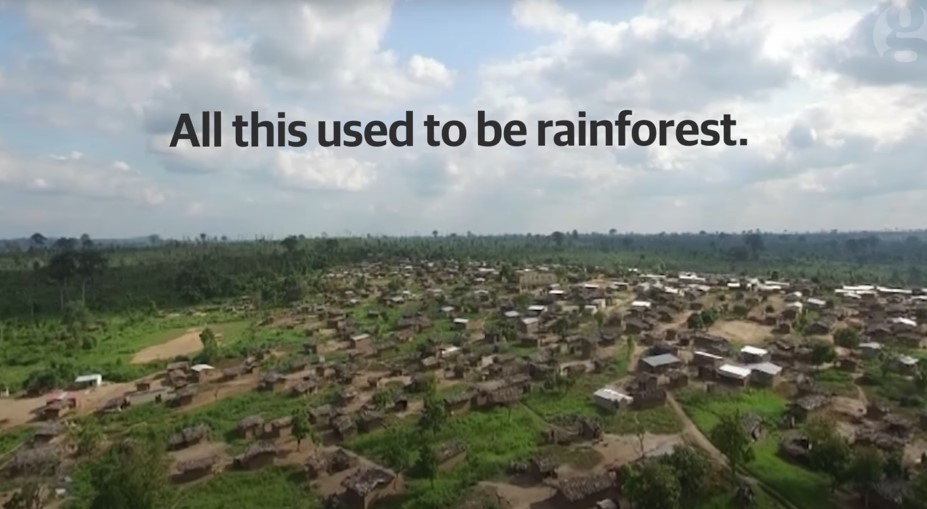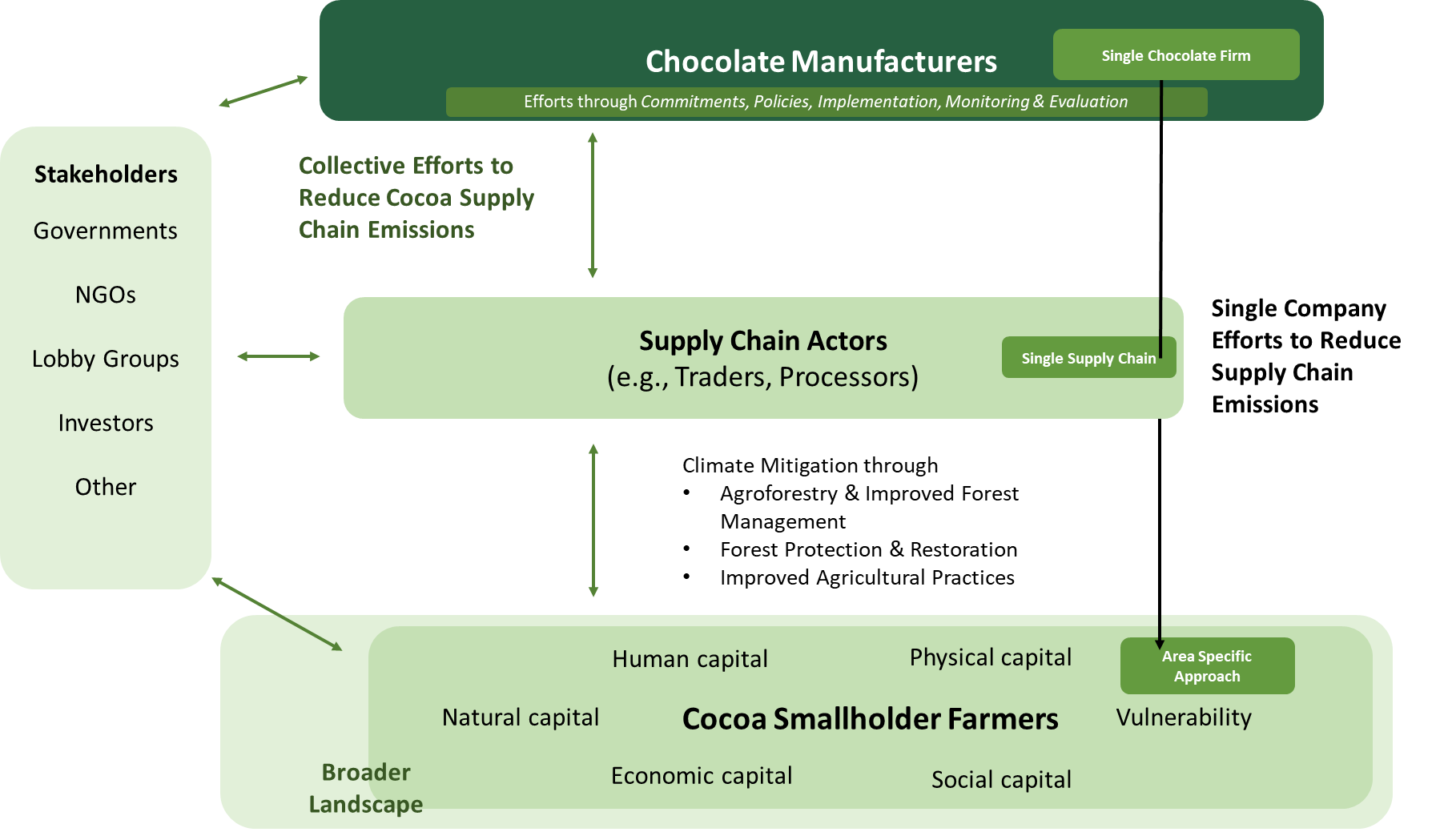Navigating Climate Mitigation in Cocoa Supply Chains for Farmers' Empowerment
With the increasing temperature records and escalating frequency and intensity of weather extremes, the urgency of climate mitigation cannot be overstated (IPCC, 2022). In my master's thesis, I researched the impact of chocolate companies implementing Scope-3 emissions reduction strategies on the management of their cocoa supply chains. Specifically, I explored how these strategies could influence the livelihoods of smallholder cocoa farmers in the Global South. In the subsequent sections, I will provide a summary of my key findings and present interesting ideas related to climate mitigation within the chocolate sector.
Untangling the issues of cocoa supply chains and smallholder farmers
To delve into the intricacies of cocoa supply chains and the challenges faced by smallholder farmers, it is crucial to acknowledge the significant contribution of the agricultural sector to greenhouse gas emissions. Forest-risk commodities, particularly cocoa, play a pivotal role in driving deforestation and causing adverse consequences for the climate (Grabs & Carodenuto, 2021). With approximately 70% of global cocoa sourced from West Africa, concerns arise about the potential unsuitability of large areas in this region for cocoa cultivation by 2050 due to the impacts of climate change, unless proactive adaptation measures are implemented.
The complexity of cocoa production unravels when we scrutinise the multitude of stakeholders involved in shaping the supply chain landscape (Grabs & Carodenuto, 2021). Astonishingly, six major chocolate firms controlled nearly 65% of cocoa purchasing, while cocoa traders were responsible for over 75% of worldwide processing and trading in 2017 (Staritz et al., 2022). Yet, the backbone of cocoa production lies in the hands of smallholder farmers, grappling with a nexus of interlinked social, economic, and environmental challenges. Although farmers’ living income might have increased in recent years, it is still often below a living wage (Fountain & Hütz-Adams, 2022), creating a precarious situation where farmers risk being caught in a poverty trap. This predicament not only impacts household income but also cocoa yields (Fountain & Hütz-Adams, 2022; van Vliet et al., 2021).
The vulnerability of smallholder farmers further hampers the transition toward more sustainable farming practices, resulting in increased deforestation as a means of sustaining their livelihoods. Illegal logging practices, fragmentation of cocoa farms, and adherence to cultural norms collectively impede the effective deployment of climate change mitigation strategies (Ameyaw et al., 2018; Codjoe et al., 2013). Thus, considering cultural context and local circumstances is important for the effective deployment of climate mitigation actions.

What measures can be taken for climate mitigation?
In the agriculture, forestry, and other land use agriculture (AFOLU) sector, climate mitigation encompasses various strategies, such as forest protection, restoration, and improved management; agroforestry; and enhanced agricultural practices (Roe et al., 2021). Chocolate manufacturers can actively contribute to climate mitigation within their supply chains through commitments, policies, implementation measures, evaluation, and monitoring (Bakhtary et al., 2020). These can include deploying net zero targets, making pledges to eliminate deforestation in their supply chains, focusing on sustainable sourcing initiatives, and committing to sourcing from agroforestry systems, among others. However, a crucial prerequisite for effective climate mitigation in supply chains is achieving 100% transparency and traceability of cocoa. This transparency is essential for the provision of technical, technological, institutional, and financial support. Chocolate companies are already pledging to achieve traceability to farms or cooperatives by specific target years and employing innovative tools like polygon mapping to address the risks of deforestation. Furthermore, the upcoming EU Deforestation Regulation reinforces the imperative for traceability by prohibiting the import of forest-risk commodities associated with deforestation (European Parliament, 2023; Zhunusova et al., 2022).
A conceptual framework for providing context
In my thesis, I have developed a conceptual framework illustrated in the figure below, combining a vertical approach that encompasses supply chain management and governance theories with a horizontal approach involving the sustainable livelihoods framework focusing on smallholder farmers. The framework demonstrates that mitigation efforts can be executed collectively or through individual company initiatives. This comprehensive perspective enhances our understanding of the repercussions of climate mitigation strategies implemented by chocolate companies and their potential impact on the livelihoods of smallholder cocoa farmers.

Navigating collaborative climate mitigation in cocoa supply chains
The collaboration and collective action emphasised by chocolate firms and stakeholders across local, national, and international levels in the cocoa supply chain have significant implications. Companies advocate for landscape approaches and specific actions crucial for effective climate mitigation. However, pre-competitive strategies are necessary to limit farmers' options to sell monoculture crops to other buyers. In addition, climate mitigation efforts increase supplier requirements, including environmental assessments, adherence to codes of conduct, and audits. Therefore, collaboration with suppliers, through assistance and project development, can support the transition to more sustainable practices.
On the smallholder level, the transition might take effort as farming practices have to be changed, and a certain mistrust might exist due to their prior experiences. Thereby, context-specific approaches and farmer engagement are of utmost importance to ensure the effectiveness of climate mitigation strategies. The complex trade-offs between increasing yields and effective climate mitigation demand careful consideration. In terms of communication with smallholder farmers, formal and informal supply chain governance measures should be undertaken through common interests and fixed contracts that require adherence to certain production standards. Nevertheless, there is a potential threat that the upcoming EU Deforestation Regulation could reduce the capacity of farmer support programmes and hinder the adoption of climate mitigation efforts by smallholder farmers due to a different allocation of financial and human resources.
Agroforestry as a potential solution?
One strategy that stood out in the arsenal of climate mitigation strategies was agroforestry. This farming approach has high potential for carbon sequestration, biodiversity growth, and climate resilience. Agroforestry can play a critical role in climate mitigation in the cocoa sector. While chocolate companies promote its benefits, it must be noted that agroforestry's impacts can be more complex than presented in companies’ reports, with trade-offs between productivity and achieving the desired sustainability goals (Blaser et al., 2018). One critical factor in adopting agroforestry practices is education and awareness of potential benefits among smallholder farmers. While the real-world impact of agroforestry may not always align with the benefits portrayed in companies’ reports, this strategy has a lot of potential benefits for smallholders through income diversification and the restoration of ecosystem services.
What about smallholder farmers’ livelihoods?
Overall, climate mitigation strategies can have a positive impact on smallholder farmers’ livelihoods. The strategies deployed can lead to income diversification through, for instance, participation in the voluntary carbon market as well as the cultivation of additional crops. Furthermore, support programmes can increase the knowledge and education of farmers, enhancing, hence, their human capital. Adopting agroforestry makes long-term farming possible through ecosystem restoration, which can generate new services and products for farmers. All of this can potentially reduce the vulnerability of local communities. However, one critical factor should be considered here: the additional effort or cost for smallholder farmers when switching to new farming practices.
In brief...
Chocolate companies are operating within a complex system, which must be reflected in their climate mitigation strategies. The industry faces a pressing demand for climate mitigation and adaptation, underscoring the importance of collaborative efforts at the landscape level, context-specific methodologies, and robust governance mechanisms. To enhance climate mitigation and farmer livelihoods within the industry, the following factors should be considered:
- Traceability is a prerequisite
- Promotion of (pre-competitive) collaboration on all levels
- Tailored support for smallholder farmers
- Balancing trade-offs
- Acknowledging potential positive impacts
The road to sustainable cocoa supply chains is paved with challenges. Therefore, the cocoa industry should work collectively to address those complex issues and take responsibility to ensure that its strategies serve not only profit but also people and the planet.
References
Ameyaw, L. K., Ettl, G. J., Leissle, K., & Anim-Kwapong, G. J. (2018). Cocoa and Climate Change: Insights from Smallholder Cocoa Producers in Ghana Regarding Challenges in Implementing Climate Change Mitigation Strategies. Forests, 9(12), 742. https://www.mdpi.com/1999-4907/9/12/742
Bakhtary, H., Matson, E., Mikulcak, F., Streck, C., & Thomson, A. (2020). Company Progress in Engaging Smallholders to Implement Zero Deforestation Commitments in Cocoa and Palm Oil. Tropical Forest Alliance and Climate Focus.
Blaser, W. J., Oppong, J., Hart, S. P., Landolt, J., Yeboah, E., & Six, J. (2018). Climate-smart sustainable agriculture in low-to-intermediate shade agroforests. Nature Sustainability, 1(5), 234-239.
Codjoe, F. N. Y., Ocansey, C. K., Boateng, D. O., & Ofori, J. (2013). Climate change awareness and coping strategies of cocoa farmers in rural Ghana. Journal of Biology, Agriculture and Healthcare, 3(11), 19-29.
European Parliament. (2023). Parliament adopts new law to fight global deforestation. Retrieved 26.04.2023 from https://www.europarl.europa.eu/news/en/press-room/20230414IPR80129/parliament-adopts-new-law-to-fight-global-deforestation
Fountain, A. C., & Hütz-Adams, F. (2022). 2022 Cocoa Barometer.
Grabs, J., & Carodenuto, S. L. (2021). Traders as sustainability governance actors in global food supply chains: A research agenda. Business Strategy and the Environment, 30(2), 1314-1332. https://doi.org/https://doi.org/10.1002/bse.2686
IPCC. (2022). Climate Change 2022: Impacts, Adaptation, and Vulnerability. Contribution of Working Group II to the Sixth Assessment Report of the Intergovernmental Panel on Climate Change (Cambridge University Press, Ed.). Cambridge University Press. https://doi.org/doi:10.1017/9781009325844
Roe, S., Streck, C., Beach, R., Busch, J., Chapman, M., Daioglou, V., Deppermann, A., Doelman, J., Emmet‐Booth, J., & Engelmann, J. (2021). Land‐based measures to mitigate climate change: Potential and feasibility by country. Global change biology, 27(23), 6025-6058.
Staritz, C., Tröster, B., Grumiller, J., & Maile, F. (2022). Price-setting power in global value chains: The cases of price stabilisation in the cocoa sectors in Côte d’Ivoire and Ghana. The European Journal of Development Research, 1-29.
van Vliet, J. A., Slingerland, M. A., Waarts, Y. R., & Giller, K. E. (2021). A Living Income for Cocoa Producers in Côte d'Ivoire and Ghana? Frontiers in Sustainable Food Systems, 5, 732831.
Recohunusova, E., Ahimbisibwe, V., Sadeghi, A., Toledo-Aceves, T., Kabwe, G., & Günter, S. (2022). Potential impacts of the proposed EU regulation on deforestation-free supply chains on smallholders, indigenous peoples, and local communities in producer countries outside the EU. Forest Policy and Economics, 143, 102817.
Also read
-
Aurélie Carlier receives Athena Award
Aurélie Carlier receives the Athena Award. This award is for exceptional female researchers who serve as role models through their successful scientific careers.
-
Despite a less tight labour market no end to shortages in healthcare, education, and tech
Interesting new findings in the report 'The Labour Market by Education and Occupation until 2030' from the Research Centre for Education and the Labour Market (ROA) at Maastricht University.
-
Protecting children’s rights in non-existent states
What happens to the universal rights of a child when their home is a “de-facto” state—a political entity that has all the hallmarks of nationhood, yet is not officially recognised? And who bears legal and moral responsibility for these children when war breaks out? These issues lie at the heart of the...